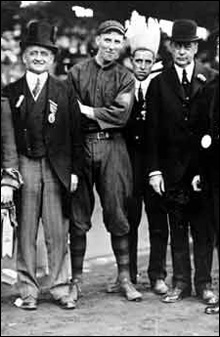But they did win the pennant there in 1948. And what might have taken place at Braves Field and at Fenway Park that fall is one of the great disappointments of Boston sports history. The Red Sox were terrific that season — but not quite good enough. They just missed the post-season, losing a one-game playoff to the Cleveland Indians, thus depriving the Hub of its last chance for a Boston/Boston subway series.
Even the Braves’ last pennant in this city, however, was arguably obscured in the hubbub surrounding the Sox’ heartbreaking World Series loss in 1946, Ted Williams’s second Triple Crown in 1947, and the epic pennant race with the Yankees chronicled by the late David Halberstam in The Summer of ’49. Even when they were playing well, the Braves couldn’t seem to catch a break.
Race to the top
If both Boston teams were talented in the ’40s, one area where they diverged drastically was in the area of race. In fact, by the mid-’50s, the Braves had one of the most integrated teams in the majors, with center fielder Billy Bruton, first baseman George Crowe, and a power-hitting right fielder named Henry Aaron, whose contract had been purchased by the team for $10,000 in 1952.
In 1945, Fenway Park played host to the now-infamous tryout of three Negro League players: outfielder Sam Jethroe of the Cleveland Buckeyes, second baseman Marvin Williams of the Philadelphia Stars, and a fleet shortstop from the Kansas City Monarchs named Jackie Robinson. The Red Sox could have signed any one of them. Could have been the first team to break the color line. Instead, after 90 minutes of hitting and fielding drills, the players heard a chilling voice boom from the shadows of the grandstand from an unknown member of the Sox brass: “Get those niggers off the field!”
Robinson, of course, made history with the Brooklyn Dodgers two years later. Less well known is that Jethroe signed with the Boston Braves in 1950. He won the National League Rookie of the Year that season, and led the league in stolen bases in ’50 and ’51. The Red Sox? They wouldn’t integrate for nearly another decade, until 1959 — the last team in the majors to do so, when they signed infielder Pumpsie Green.
“Jackie Robinson had been retired for two and a half seasons before they signed Pumpsie Green,” says Johnson incredulously. “The Bruins were integrated before the Red Sox!
“The Braves were very progressive,” he continues. “But I don’t think they were out to make a social statement. They were like the Celtics: trying to get the best players they could, and they weren’t letting the old conventions dictate anything.”
Imagine for a moment what having Hammerin’ Hank in Boston for 22 seasons might have meant. If he’d hit those 755 home runs in the Hub, might it have done something to change the racial climate in this infamously segregated city?
“Hank Aaron would have been unbelievable,” says Magrane. “It probably would’ve taken some of the stigma out of race relations. Here’s a Boston baseball team with a phenomenal black player. You wouldn’t get some of the stigma that surrounded the Red Sox — you always hear that they were racist.”

A DIGNIFIED CROWD: Honey Fitz (second from left) was a regular at the team’s watering hole. |
A change will do you good
The Braves’ fortunes took a turn after moving to Milwaukee: they played before a record 1.8 million ecstatic fans their first season in a brand new stadium; Eddie Mathews won the home-run title; and Spahn led the league with 23 wins. They won the World Series in ’57 and added another pennant in ’58.In 1966, taking advantage of the burgeoning Southern market, the team headed to Atlanta, where their success was even greater: pennants in ’91, ’92, ’96, and ’99, a World Series in ’95, and 11 straight division titles. Broadcast nationwide on owner Ted Turner’s WTBS, they were marketed as “America’s Team.”
All that glory contrasts sharply with the team’s final years in Boston. “The handwriting was on the wall when only 200-something thousand came in 1952,” says Johnson. “Only two games topped 10,000, which was hard to believe. The Braves were at the cutting edge, but they were the second team in a town that, at times, didn’t even support the Red Sox that well.”
So many what-ifs. What if there had been a Red Sox-Braves World Series in 1948? And what if the Braves had won? Might we be rooting for John Smoltz instead of Curt Schilling?
“I still get a lot of calls and a lot of letters,” says Altison, “stating that the wrong team left Boston.”
Luckily, before leaving for Milwaukee, the Braves handed the reins of one of their signature achievements off to the Red Sox: the Jimmy Fund. Although it’s impossible to diminish the great work the Red Sox have done with the Jimmy Fund over the last five decades, it’s hardly ever remembered that it was the Braves who were the favorite team of the original “Jimmy,” the late Einar Gustafson. It was Braves players who crowded into his hospital room when he appeared on Truth or Consequences. It was Ashland-born owner Lou Perini who founded the charity with Braves PR man Billy Sullivan.